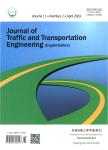Investigation on the low temperature rheological properties of polymer modified asphalt
作者机构:School of Materials Science and Technology, Chang'an University School of Highway, Chang'an University
出 版 物:《Journal of Traffic and Transportation Engineering(English Edition)》 (交通运输工程学报(英文))
年 卷 期:2023年
核心收录:
学科分类:08[工学] 0805[工学-材料科学与工程(可授工学、理学学位)]
基 金:supported by the National Key Research and Development Program of China (No.2021YFB2601000) the Scientific and Technological Project in Shaanxi Province (2022KW-37) the Special Fund for Basic Scientific Research of Central Colleges Chang’an University (No.:300102213501)
摘 要:Traditional pavement is prone to cracks, and other distresses in cold regions. In this case, asphalt modification is a common technique used to improve the performance of asphalt. This study attempts to compare the low temperature properties of three modified asphalts. For this purpose, the addition of crumb rubber (CR), modified crumb rubber (MCR), and styrene–butadiene–styrene (SBS) to the base asphalt, respectively, and CR modified asphalt, MCR modified asphalt, and SBS modified asphalt is firstly prepared. Then, the asphalt specimens are subjected to a thin film oven test (TFOT) and pressurized aging vessel (PAV) test. The bending beam rheometer (BBR) test is conducted to compare the rheology characteristics and anti-aging performance of three modified asphalts. Furthermore, the low temperature performance of three modified asphalts is compared by three approaches based on the performance grade (PG), critical low temperature, and Burgers model. The BBR results show that the CR modified asphalt has the best low temperature performance. However, the CR modified asphalt show poor aging resistance, SBS modified asphalt, and MCR modified asphalt have better aging resistance. In terms of the Burgers model, it is established to analyze the resistance to low temperature cracking of four asphalts from the perspective of viscoelastic properties. Different viscoelastic parameters indicate that the low temperature performance of CR modified asphalt is superior to the other asphalts, which is consistent with the result of the critical low temperatures.



